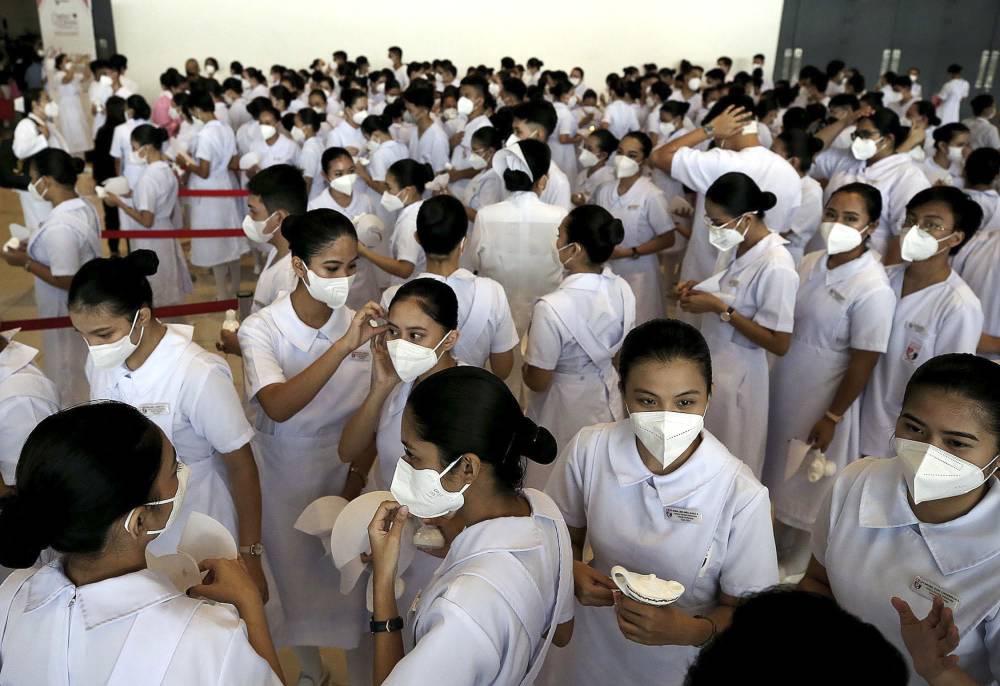
CLOSING THE GAP Under a 2023 agreement between the Commission on Higher Education (CHEd) and the Department of Health, nursing students may be trained as “clinical care associates” and be hired in hospitals and other health-care centers, even if they have yet to take licensure exams. As added incentive, they will receive supplemental mentoring and may take review classes for free at CHEd-accredited centers. —RICHARD A. REYES
The Private Sector Advisory Council (PSAC) is optimistic that the country will eventually close the gap in the shortage in nurses with the hiring of more nursing students as “clinical care associates” in hospitals.
In a meeting with President Marcos on Thursday, PSAC’s health-care sector group led by Ayala Healthcare Holdings Inc. president Paolo Borromeo explained that an upskilling program for such students would help them qualify for the job even if they have yet to pass the nursing licensure exam.
Borromeo said 304 nursing students had already been hired under the program, which started late last year, according to a statement from Malacañang on Friday.
The Department of Health (DOH) reported last year that in 2022, the Philippines was short of more than 106,000 nurses.
Formed in 2022, the PSAC is composed of business leaders and experts in six main sectoral groups—agriculture, infrastructure, digital infrastructure, jobs, health care and tourism—and makes policy recommendations and regularly reports on their implementation to the President.
Mentoring
The nursing upskilling program will allow students to be certified by the Commission on Higher Education (CHEd) to work as clinical care associates.
Under a joint administrative order signed in July 2023 by CHEd head Prospero de Vera III and DOH Secretary Ted Herbosa, nursing students who had undergone upskilling will be employed under a one-year contract to perform “important noncore functions.”
The DOH also will provide coaching and mentoring to help the hired students pass the licensure exam.
These students are also entitled to attend review classes for free at CHEd-certified schools.
P20-million budget
Those who fail the exams may still be rehired under a new contract.Borromeo informed the President that for 2024, the CHEd allocated P20 million for the nursing board exam review of 1,000 clinical care associates.
He said the recruitment of potential clinical care associates who would take the November 2024 exams was ongoing to fill the 1,000 slots opened by CHEd.
Borromeo added that the PSAC would roll out the program for next year’s licensure exam at the end of the current batch’s contract.
“That’s an instant addition to our nursing population. If we are able to fill the seats that CHEd Chair Prospero de Vera III was able to get, that’s 1,000 clinical care associates. But as of now we’re at 300,” he said.
‘Not a small number’
Borromeo added that 1,000 clinical care associates “is not a small number” for a country that graduates 7,000 to 10,000 nurses yearly.
“So instantly, we have a thousand just like that. So, I characterize that as a big win and I want to commend the CHEd chair for that,” he said.
In his meeting with the PSAC health sector group in September last year, Mr. Marcos directed government agencies to work with the PSAC on its recommendations to address the shortage of nurses and other issues.
During Thursday’s meeting, Borromeo’s group also updated the President on efforts to improve the capacity of the health-care system and access to medicines.
He cited the CHEd’s enhanced one-year master in nursing program, which shortened the regular three-year program, as a “significant development” in producing more nursing instructors in the country. The PSAC will implement this program starting academic year 2024-2025 in 16 colleges and universities, he added.
Bilateral accords
Borromeo also appraised the President of the Philippines’ bilateral labor agreements with other nations as a “big win,” citing the pilot memorandum of understanding (MOU) with Austria forged through the help of the Department of Migrant Workers and the Department of Foreign Affairs.
Under the deal, the Austrian government will provide scholarships, faculty support and an adopt-a-school or -hospital scheme. The PSAC said it will push for the President’s approval of the MOU.
Other measures to improve the capacity of the health-care system are the PSAC’s underboard certificate program, Balik Nurse Campaign and the National Human Resource for Health Masterplan.
CHEd and the Technical Education and Skills Development Authority are still discussing the underboard certificate program, while the PSAC has yet to define the specific features of the Balik Nurse Campaign.

